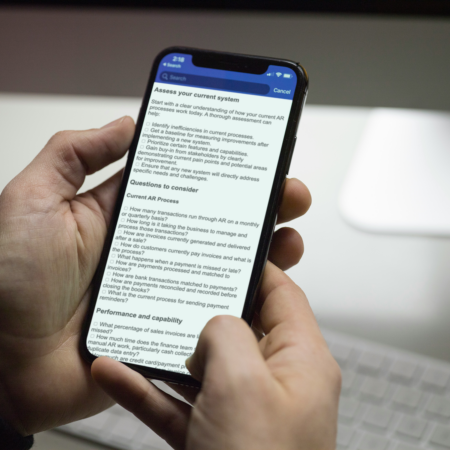
Everything is going digital, including taxes. Before, it was optional for tax data to be stored and completed digitally, the United Kingdom’s Making Tax Digital (MTD) initiative is making this required. What does this change entail? Are there risks? More work involved? While change is always unsettling, MTD can actually be a major benefit for your whole accounting process, with the right tools. Let’s look at why.
What is Making Tax Digital (MTD)?
As mentioned, MTD is the national initiative put forth by Her Majesty’s Revenue and Customs (HMRC) to make all tax administration more efficient and precise in the UK. MTD was also instituted to make the tax filing process easier and more accurate for UK taxpayers. In essence, it’s a win-win. The main hurdles most businesses are concerned about are the guidelines for managing and filing tax information. This necessitates the use of software with specific requirements in order to comply with MTD.
Besides being required by the HMRC by April 2020, MTD is pretty much inevitable whether legally mandated or not. The rise of cloud-based accounting systems and tax tools like Avalara are already moving the entire financial management process online. To add to this, other European nations are pivoting towards digital tax management too. 53 percent of large companies in Europe have reported that tax regulations, and the amount of data required to support the process, have significantly increased. Additionally, 37% of these organizations believe that their own tax authorities will implement digital tax compliance rules similar to MTD.
Digital tax administration is continuing to grow on a global scale. Even if MTD is altered in any way because of Brexit, the trend is on the rise. Already, it’s simply an easier and more accurate way to do taxes. This is only perpetuated by the innovations in IT and how they can optimize reporting and accounting efficiency. While MTD might require a change in policies and technology, this offers a lot of value and convenience to your company.
5 Benefits of Making Tax Digital
While it’s jarring to switch to completing taxes digitally, this comes with a lot of benefits for every organization, not the least of it is saving time and money! Here are five major benefits of MTD.
1. More Accurate Data
Digital accounting and tax management are far more efficient then scrambling through physical documents or having to manage multiple spreadsheets. Both methods put your company at risk for multiple data errors and misplaced information. All updates and corrections must be done manually. Leveraging a Cloud accounting solution helps you keep all your financial data consolidated and connected with vital tax reporting tools to make the process streamlined and consistent. With a system that emphasizes automation, manual labor and human errors are dramatically decreased, which helps you maintain only accurate records. Implementing automation also provides many other key areas of business too.
2. No More Paperwork
Digital tax management doesn’t require physical paper, so this saves you time and money from doing the work on paper. Additionally, this is great for environmental conservation as this reduces the demand for deforestation to supply paper. As an added bonus, pro-environmental initiatives and policies are rising in popularity among customers, so you can leverage this change to boost brand appeal.
3. Less Stress
Digital tax filing takes the strain out of tax season because your gathering process is reduced because of the data stored on your digital accounting system. Because your data is more accessible and controllable, you don’t need to worry about collecting the information. With the right system, all the information you need to do your taxes is at your fingertips. Worried about errors or not finding details within your ledger? Systems like Accounting Seed provide features like the Ledger Inquiry Tool to research underlying transactions to ensure accuracy. When you need specific information, users can drill down to view specific transaction details. While changing to digital tax filing may seem stressful, the process itself can actually give you greater peace of mind.
4. Faster Tax Process
MTD empowers you to complete tax reporting initiatives faster than ever before. Through real-time reporting and automation in your accounting processes, to having all your financial data in a single system, all that you need is instantly available. This lets you submit your taxes and reports without having the legwork of doing it manually.
Investing in strong accounting software to complete MTD is ultimately going to empower you to save money in the long run. The enhanced accuracy of your bookkeeping will help you avoid costly issues like revenue drain, help your company make stronger business decisions, and help you avoid tax mistakes. The last thing you want is late payment fines due to filing errors or inaccuracies. MTD puts the time and control back in your hands, which you can use to keep more money in your pocket!
Accounting Software is Key
Clearly, these are some significant benefits to going digital, but the level of convenience and accounting accuracy will also depend on your chosen software. MTD actually requires businesses to have specific features in their accounting software to enhance the digital tax management process and maintain accuracy.
MTD Accounting Software Requirements
- The accounting must be digital, or cloud-based.
- The accounting system must have features that ensure financial data is secure.
- The accounting platform must be able to manage all of your financial data on a single solution.
- The solution must be able to store up to six years of financial records.
- Your system has to be able to generate a Value Added Tax (VAT) return and share it with HMRC.
- The accounting system must be equipped to share VAT data with HMRC on a voluntary basis.
- The system has to be able to receive data from HMRC.
All of these capabilities must be done within the accounting software to be MTD compliant. At this stage though, MTD is constantly shifting priorities and requirements due to Brexit and other policy changes. There is a fail-safe way to ensure your company has the best solution to both comply with MTD and manage your accounting and taxes easier: flexibility.
The Power of a Flexible Accounting System
>Harnessing an accounting system that can be configured and customized to your specific needs as a business, but also ensures that you can adapt the system to meet any new MTD requirements. This empowers your organization for the demands of today and future needs, such as scaling your financial management to accommodate growth and business changes. System flexibility also influences how well your accounting solution can connect with HMRC, tax calculation tools, and other apps you use to run your business.
Connection Brings Convenience And Accuracy
MTD forces you to connect directly to HMRC, but if that’s not enough, you may also need a tax calculation tool such as Avalara – which can directly link to HMRC. But realistically this isn’t enough. To maintain accurate accounting while saving you time from manually re-entering data or heavily using spreadsheets, you need a solution that can reliably share data with the other tools you’re using to generate financial data. This actually streamlines your entire financial management process, letting you manage customer accounts from lead to ledger. No more having to hunt down information. Once you start a process in one app, with the proper accounting tool, the information can then be instantaneously shared and used to generate a billing or other financial processes.
One of the main benefits of choosing an accounting software built on the Salesforce platform is that there’s no need for costly integrations to a solution outside of Salesforce. It’s already natively connected. However, if the accounting system uses an OpenFace API like Accounting Seed, it can connect to tools on and off the Salesforce ecosystem – like to Avalara which can then link to HMRC. However, with this connection capability must also come security.
Prioritize System Security
One of the most important requirements for MTD is that your system is secure. Besides ensuring your tax reporting accuracy, this also ensures your company and customers’ data is safe. Essentially, the data risks of MTD can be grouped into two categories, external threats and internal threats. Both are controllable, but your level of prevention is closely tied to the features and design of your accounting solution, as well as your own policies.
When exploring accounting solutions, be sure to examine the security features of the software. Is the architecture the tool is based on and technical support equipped to prevent and address cyber threats? Are their internal controls like user permission settings, role hierarchies, and validation rules to prevent internal mistakes and data theft? All of these features are essential for preserving your data’s vitality and the welfare of your organization! It’s an investment that keeps paying off with secure financial information.
Better Accounting, Faster Taxes
It’s true, you will have to prepare for MTD, but ultimately the benefits make these preparations pay off well beyond any initial frustrations. Using an accounting system that meets the requirements and the desired feature scope will help your adoption of MTD much easier as well. This new system and digital tax process will then go onto help you manage your overall business a lot easier. Take the ‘taxing factors’ out of doing taxes, go digital!
See Accounting Seed in action
Get a close-up view of how accounting on Salesforce can eliminate the need for costly integrations—and silos of mismatched information—by sharing the same database as your CRM.


